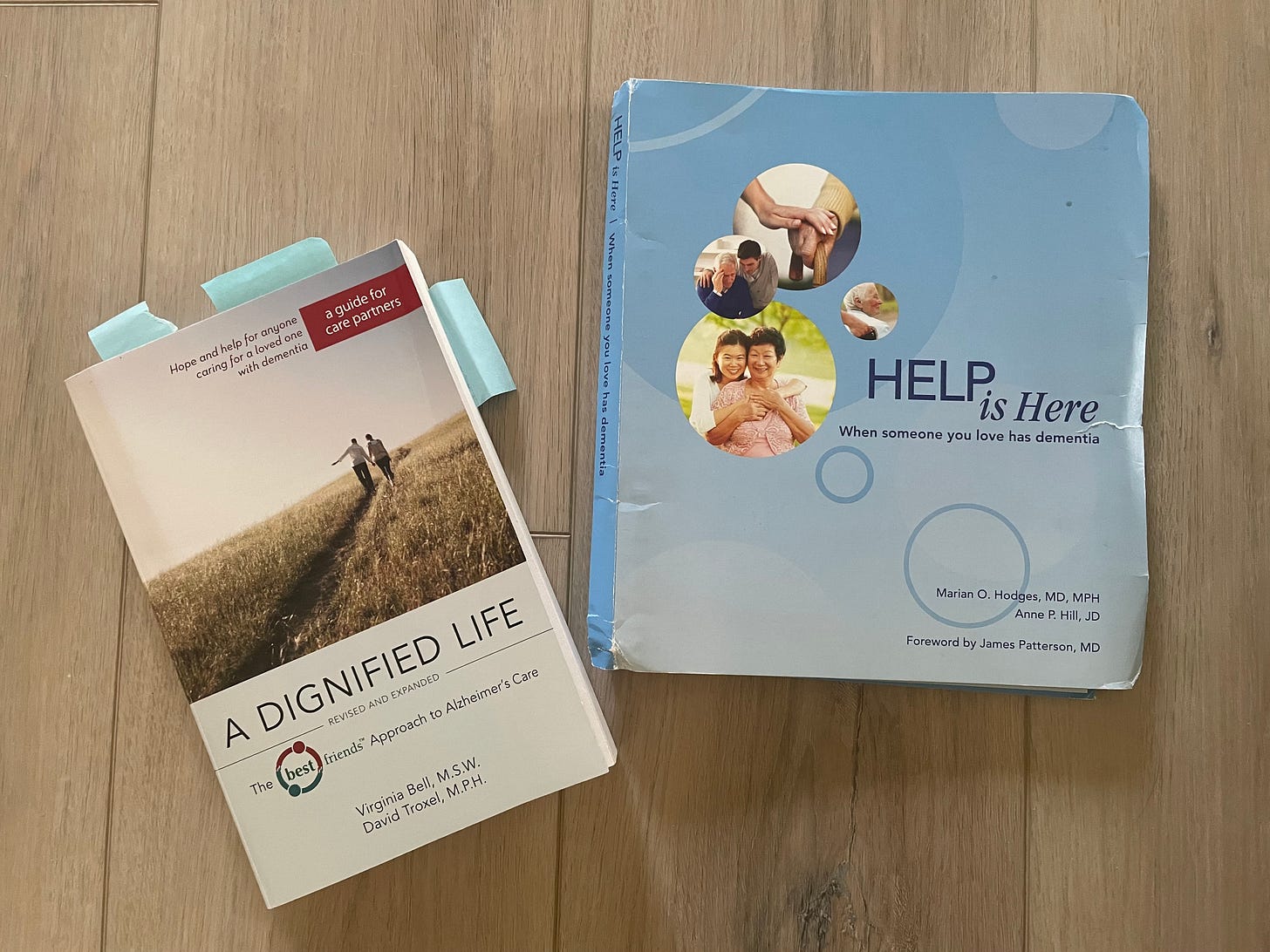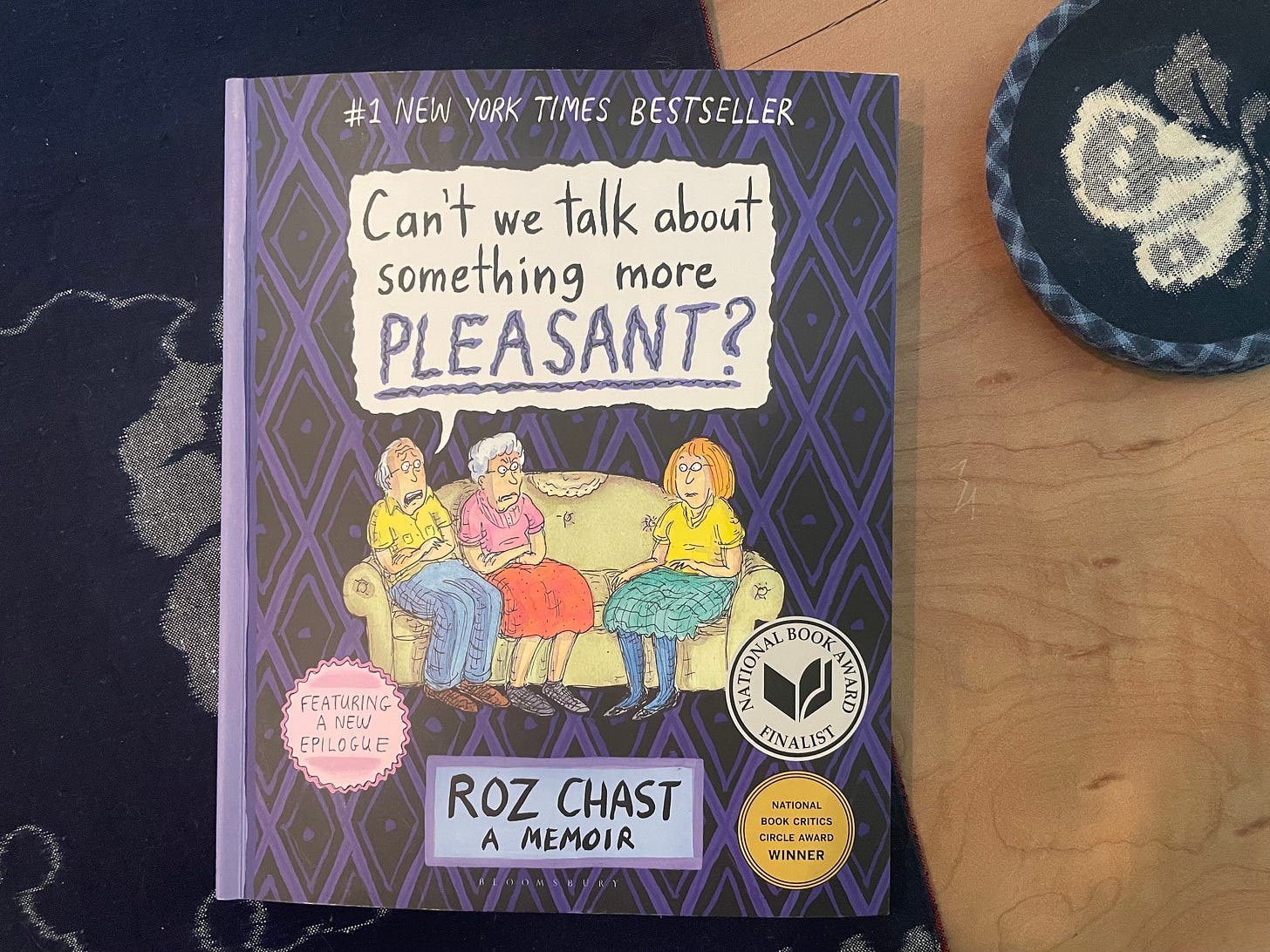<Welcome to Sandwich Season, adventures in middle age, sandwiched between aging parents and growing children ... and other duties as assigned.>
Hello everyone—
“You are not alone.”
This is what a communications client told me last year as my mom was entering hospice care.
At the time, I was bouncing between meetings for my consulting work, my parents’ new apartment and my parents’ house, where I was sorting through a couple of lifetimes’ worth of belongings.
When he told me I wasn’t alone, I wondered … was he offering to come over and help? That couldn’t be it. Was he referring to the fact that God is always with us? That didn’t seem quite like the direction he was heading either.
On reflection, I think his message was this: If we are fortunate enough to still have our parents with us into our own middle age, many of us will also experience challenging times. Letting go, saying goodbye, clearing out drawers and closets and basements, times of having to do so many things we think we cannot do.
So, although it was my first time walking this path, and it was all new and overwhelming to me, my client was absolutely right. I was not alone.
As I spent time in my parents’ new retirement community, I heard the stories of many other older adults and their children, plus staff, who had gone or were going through similar experiences.
As I worked my way through my parents’ house, delivering items to consignment shops, antique stores, thrift shops and recycling centers, I encountered others doing the same thing for their parents.
As I read my local paper, the New York Times and other publications, I noticed more and more stories not unlike my own.
I realized that I am just one recruit in an army of people in my generation helping their parents downsize and receive the services and care they need in their older years. As my mom would say, “‘Twas ever thus.”
I also realized that—and this is a lesson I have needed to learn over and over—until we ask for help, or until someone insists on helping us (as my dear friend Linda Nixon did, flying out from Washington to spend a week with me clearing out a very full basement scheduled for mold remediation), we can feel quite alone in the actual on-the-ground activity of helping our parents.
A few resources to help you feel less alone
I’ve had several conversations over the past few weeks with friends who have family members with dementia and are in various stages of that journey.
Walking with or caring for a family member with dementia is like entering another culture. Many of the customary social and familial rules no longer apply. Or at least not all the time. Expectations change—and if they don’t, everyone suffers.
I have been sharing with friends, one by one, some of the resources that helped me with my mom’s journey, so now I am sharing them here. (If you are new to Sandwich Season, my mom passed in August 2023.)
Support/study group
In early 2022, I joined a several-week Zoom seminar/support group called PAC (Positive Approach to Care) Partner Support Series.
Led by Kellie, a woman with experience caring for a family member with dementia and trained in PAC methods, these online classes helped participants understand dementia better and offered strategies for caring for loved ones living with the condition.
Being part of this group was incredibly helpful for two primary reasons:
I learned a lot about dementia and began adjusting my expectations of my mom—and of myself.
I learned new ways to engage with my mom as her dementia progressed.
Because everyone in the group had a family member living with some level of dementia, we learned from each other and got used to talking about these topics.
I learned this week that Kellie has retired, but she recommended reaching out to the PAC organization, which is based in North Carolina and led by an amazing woman named Teepa Snow. I say Snow is amazing, because we watched many of her videos as part of Kellie’s seminar. They were very informative and insightful. The PAC website is here.
In fact, a five-week Care Partner series is scheduled to start July 9. You can find information here.
Memory Café
Another resource to check out is Memory Café.
Memory Café hosts gatherings for people with dementia and their loved ones, where they can go and enjoy visiting and activities in an environment that is supportive for both.
For various reasons, we never made it to the Memory Café with my mom, but I had several people recommend our local one in Fargo-Moorhead wholeheartedly.
Memory Cafés exist across the United States and several other countries, as well as online. You can locate one here.
Here is the general Memory Café website for more information.
Books
To be honest, I found it hard to read about dementia when we were in the midst of it.
That said, here are two books I kept close, like a security blanket:
Help is Here: When someone you love has dementia (Providence Health & Services-Oregon, 2014) by Marian O. Hodges and Anne P. Hill.
This is a great entry-level or summary book. Only 90 pages long, it is user-friendly, with six focused sections:
Things to know about Alzheimer’s Disease and related dementias
Day-to-day living
Things to think about soon
Things to think about later
Taking care of you, the caregiver
Ways to learn more
Here are a few of the tips I highlighted from the day-to-day living section:
“The best approach is to never correct your family member, at all. Find some other topic of conversation. … The key is to distract your family member, then change the subject without provoking a confrontation.”
“Useful phrases: ‘Wow. I didn’t know that.’ ‘No kidding!’ ‘Tell me more.’”
“Say One Thing at a Time!”
“Be Always in THEIR World.”
Also helpful are the book’s suggestions for having a productive medical visit.
And, very importantly, Hodges and Hill discuss the importance of creating two teams: one for your family member with dementia and one for the caregiver(s). Everyone needs support on this journey.
Related note: For us, creating a caregiver team for Dad and me was challenging, because (like many) we like to think we can handle our own situations and don’t like to ask for help. (Sound familiar to anyone?)
However, when our family sent out an email to friends requesting support near the end of Mom’s life, they came out for us like champions.
You can read our email and how our friends responded here.
A Dignified Life: The Best Friends Approach to Alzheimer’s Care (Health Communications, Inc., 2012) by Virginia Bell & David Troxel.
On the cover, A Dignified Life is described as “a guide for care partners”—“Hope and help for anyone caring for a loved one with dementia.”
At 317 pages, this is a more in-depth book, but it has a good index, and I read it here and there, checking out topics when I needed them.
What was especially helpful for me was its overall philosophy of releasing expectations. Bell and Troxel write, “What a person with dementia needs is a best friend, someone who understands, is supportive, communicates, and encourages activity and engagement.”
Up until the very end of her life, my mom often still functioned like my mom, relationally. But this book helped me release her from the expectations—both positive and negative—that I brought to that relationship and to release her from the responsibilities of functioning as a parent.
While I was still very much her daughter, I also tried to act as a “best friend.”
Here are a couple of “Best Friends Pointers” from the book:
“The person with dementia mixes up relationships. Wife becomes ‘mother’ or ‘sister.’ Recasting relationships to be a Best Friend is a life-affirming, positive response and helps care partners overcome their sense of loss.”
“Use the elements of good friendship, such as giving compliments and offering encouragement and support, to develop creative responses to challenges and turn a ‘no’ into a ‘yes.’”
Another thing that I found extremely helpful was the book’s section on “substituted judgment.”
As my parents moved into a retirement community, there were so many decisions to make. What to take, what to give away, and on and on. Initially, I consulted with my mom on many things.
Do you want this sweater or that one? Which plates would you like to take? Do you want these books? Should we give these decorations away?
I found that my mom’s answer was almost always to keep whatever it was I brought her attention to, or to maintain the status quo.
Stay in the house. Keep the suit and all of the plates and the books and everything else.
But we couldn’t. And initially it felt disrespectful to go against her wishes. This was her life, these were her things. I felt torn.
Here’s what Bell and Troxel wrote:
“Substituted judgment is the idea in ethics that one can make a decision for someone else if he or she is impaired. We do this by imagining what the person would say if he or she was able to weigh in on the topic. …
“If I could roll back the clock and ask Mother, what would she want me to do in this circumstance? … Substituted judgment can help us look at a caregiving situation with fresh eyes and make the best decision for our family member and for ourselves.”
With the idea of substituted judgement in mind, I was able to go back in time and recall earlier conversations we had had about aging, about our attachment to things, about how she wanted her last years to be and so on.
Memories of my Mom from years earlier served as helpful advice, and I found a measure of peace in going forward and making decisions on my own.
Can’t we talk about something more pleasant? (Bloomsbury, 2019) by Roz Chast.
Several months ago, I received an email from a Washington friend, Linda Bisch (another Linda!), who told me about an illustrated memoir by the cartoonist Roz Chast.
Called Can’t we talk about something more pleasant?, it chronicles her experience working with her parents as they aged, needed care, moved into a retirement home and then eventually passed away. It’s a poignant read but also, at times, laugh-out-loud funny.
“It hits all the notes for anyone who is in or has been in this season,” writes Linda. “On a side note, when we were in the thick of things, I sent it to my sister for Christmas, and she unknowingly sent a copy to me the same year.”
I keep this book on our coffee table now as a very important reminder:
In this season, I am not alone.
Neither are you.
All my best to you and yours,
Sarah
Bonus resource
Victoria at Carer Mentor shares her journey caring for her parents in the U.K., along with research and thoughts on the act of caring, self-care, resources, strategies and so on. If you are looking to feel less alone on a caregiving journey, I encourage you to check out the resources at Carer Mentor.






Thank you for this. Always on the lookout for how to help loved ones dealing with memory issues.
I'm so grateful you compiled this list of valuable resources. Will share with my network and save to come back to again!